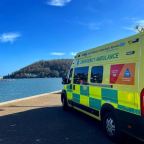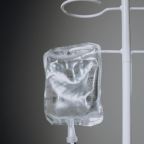
A nurse's reality of being clinically extremely vulnerable
A nurse has shared her experience to warn of the risk of passing on coronavirus to somebody who is shielding because they are clinically extremely vulnerable.
“I’ve never smoked a single cigarette, but in essence the treatment that I am now on is very similar to someone with COPD”, said Lisa Cripps.
Ten years ago Lisa was a phenomenally fit 40-year-old who spent two-and-a-half hours in the gym, four mornings a week. She had a personal trainer, did up to ten hours of Tae Kwon Do each week and competed at a national level. She cycled to work, and if she was bored she went for a run.
However, she began to develop an unusual form of severe asthma. The symptoms crept up gradually starting with disturbed sleep, fatigue, pneumonia, recurrent chest infections and wheezing on exercise.
“I’ve spent the last ten years under the care of a respiratory consultant trying to get myself stable”, she explained.
Lisa had developed a mucus hyper secretory phenotype, which means that not only do her lungs produce too much mucus; she also struggles to clear it.
“I have to nebulise daily, take drugs to breakdown the mucus, nebulise saline to try and make it easier to clear. I take daily antibiotics to dampen down the immune response in my lungs. I also have to take immune response blocker tablets, long acting steroids and muscle relaxant inhalers every day. If I do this I can function.
“Without this, or if I catch any respiratory illness, it has a huge impact on my ability to breathe, speak or work and my recovery is longer than those with normal lungs.
“Asthma seems like a trivial disease, but I have a type that whilst unusual not only changed my lifestyle, it changed my career. I had to leave Intensive Care Nursing because I didn’t have the stamina to do it anymore.”
Lisa is a Lead Nutrition Nurse and, along with her family, has been shielding at home since March 2020.
She adds: “I’m very lucky to have been supported to work from home and many of my patients in the community are in similar situation to me.
“It’s been incredibly eye opening. It makes you realise that it only takes one person to not wash their hands, wear a mask, or follow the rules and, at the end of that chain, the virus can end-up killing someone like me and my patients.”











